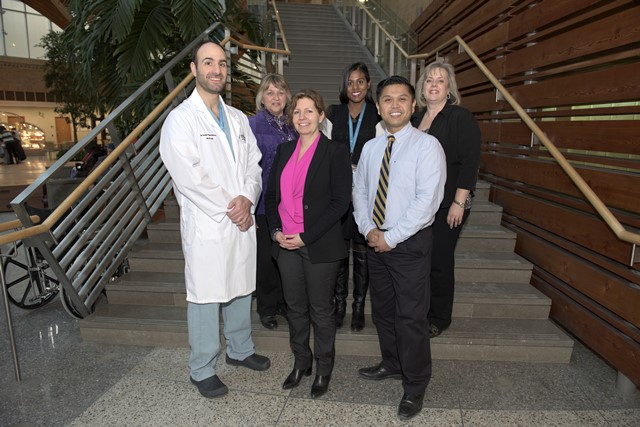Research shows that an active flu season often results in additional Emergency Department visits, causing increased wait times for patients and placing added strain on health care resources. During last year’s flu season, there were 1,378 cases of influenza reported in the region of Peel – one of the busiest seasons to date. At Mississauga’s #Trillium Health Partners, flu-related Emergency Department visits increased by 68 per cent during last year’s flu season. Hospital patients who are also residents in a long-term care home can face increased risks during flu season, especially when the home they live in is experiencing an #outbreak of flu or other illness among its residents. To support residents returning to their respective long-term care home from hospital during an outbreak period, Trillium Health Partners initiated the Outbreak Task Force for Repatriation During Outbreaks, a collaborative partnership among key health care providers in its region.
As part of its mandate to support safe discharge for residents returning to a home where there is an outbreak, the joint task force created a comprehensive Repatriation Toolkit supporting discharge decisions, including a care pathway to ensure that residents who could return to their long-term care home will be able to do so. The toolkit facilitates communication between all partners, including patients and families, helping them to understand discharge risks and benefits, and includes an infection prevention assessment prior to the patient’s discharge. As part of this year’s flu season preparedness, the collaborative task force holds weekly meetings to allow for real-time adjustment and problem solving of any system-wide issues that might impact a resident’s discharge to long-term care homes within the region.
“Many common illnesses are easily transmitted in an institutional environment. Through the joint task force, we’ve been better able to assess risks and provide support to ensure appropriate infection control measures are in place and sustained, such as ensuring private room placement, availability of personal protective equipment (PPE) or administration of prophylaxis like Tamiflu, prior to a patient’s discharge. This helps ensure residents returning home can do so as safely as possible, and reduces their chances of further illness, while also preventing transmission,” says Marianita Lampitoc, Manager, Infection Prevention & Control, Trillium Health Partners.
Launched as a pilot in the Spring of 2015, the joint task force is comprised of Trillium Health Partners’ three-site hospital, Sienna Senior Living, the Region of Peel Public Health and the Mississauga-Halton Local Health Integration Network (MH LHIN). The Nurse Practitioners Supporting Teams Averting Transfers (NP STAT), a LHIN initiative dedicated to minimizing health risks for frail seniors by supporting their transfers between a hospital emergency department and their long-term care home, is also supporting the joint task force. Additional partners include Halton Health Care, Halton Region Public Health and Toronto Public Health.
“During last year’s outbreak season, we noticed that many patients who were ready to go home were waiting unnecessarily, because the long-term care home they were going back to was experiencing an outbreak,” says Amy Persaud, Clinical Educator – Patient Flow, Trillium Health Partners. “The repatriation toolkit contains an ethical framework that looks at risks and benefits to the resident, to the long-term care home, and to the hospital as well. It helps get everyone on the same page so that a decision to discharge becomes a collaboration, with the patient’s best interests in mind,” she says.
“The collaboration among various system partners provides the opportunity for each care partner to develop an understanding and an appreciation for each other’s roles. It opens a dialogue that helps each person to see a complete picture and discuss limitations openly from a variety of viewpoints. As a representative of long-term care, I was very appreciative of the opportunity to be heard in a very supportive environment,” said Barb Ashenhurst, Director Of Care at Sienna Senior Living, Streetsville Care Community.
“There are so many factors affecting repatriation – what’s best for the resident, the cause of the outbreak, infection control practices in the facility and system capacity. As part of the joint task force, I share how public health guidelines govern outbreak management and repatriation of long-term care residents, and identify areas where there could be situational flexibility,” says Monali Varia, Manager of Infection Prevention & Surveillance at Peel Public Health.
Supported by learnings from last year’s flu season, the collaborative approach initiated by the Outbreak Task Force for Repatriation During Outbreaks continues to benefit patients and families, and is well positioned to support smoother, faster discharges for patients as flu season peaks in the winter of 2016.


